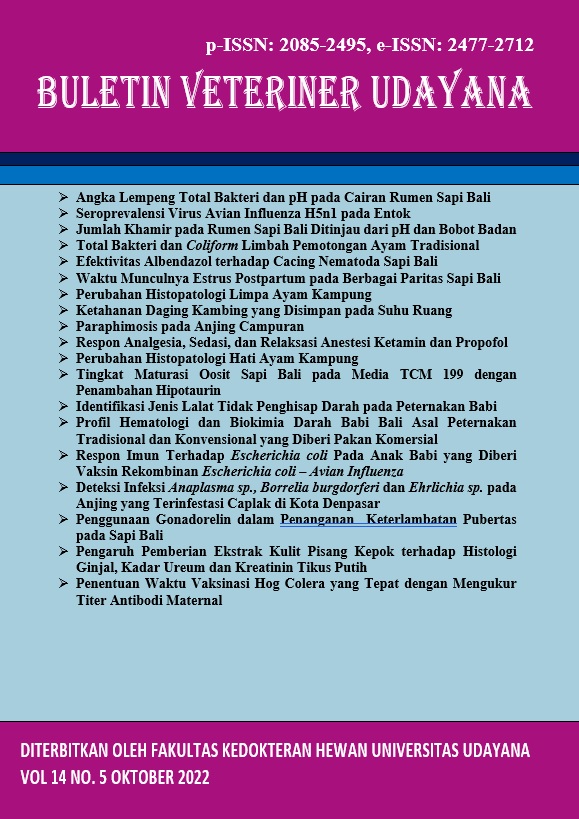IMMUNE RESPONSE TO ESCHERICHIA COLI IN PIGLETS THAT GIVEN ESCHERICHIA COLI – AVIAN INFLUENZA RECOMBINANT VACCINE
Abstract
Escherichia coli as a cause of colibacillosis is an important disease in pig farms because it causes weight loss, death in pigs, and significant economic losses. Handling colibacillosis by using antibiotics can cause a resistance effect, so we need an alternative to using a vaccine. The latest vaccine development by Udayana University using E. coli isolates from the Bali area was carried out to use this problem. Research on immunization against E. coli in piglets who have been given a recombinant vaccine E. coli - Avian Influenza. The sample used in this study was serum from 12 piglets. In this study, the sample was divided into two groups, namely the treatment group with vaccines and the control group without vaccine assistance. The group was given the vaccine at age of 1 week and repeated at age of 3 weeks, and the serum from both of groups was taken when the pigs were 4 weeks old. The serum is then tested using an Enzyme-Linked Immunosorbent Assay (ELISA) serological test. The results showed a varying optical density figures, the study group had an average optical density of 1.010 and the control group had an average of 0.418. Analysis statistic using the unpaired t-test, the two groups had significant differences. The level of antibodies against E. coli in vaccinated piglets is higher than the level of antibodies against E. coli in unvaccinated piglets. Diarrhea case data is used as supporting data that shows significant differences in the group given the booster vaccine in the third week. In the fourth week of the vaccination group, no piglets were diarrhea, while in the unvaccinated group 4 diarrhea was taken. The conclusion that were an increase in the immune response in pig that given the recombinant vaccine E. coli rather than control group.
Downloads
References
Boerlin P, Travis R, Gyles CL, Reid-Smith R, Lim HNJ, Nicholson V, McEwen SA, Friendship R, Archambault M. 2005. Antimicrobial resistance and virulance genes of Escherichia coli isolates from swine in Ontario. App. Environ. Microbiol. 71(11): 6753-6761.
Dinas Peternakan dan Kesehatan Hewan. 2016. Laporan Tahunan Dinas Peternakan dan Kesehatan Hewan Provinsi Bali. Dinas Peternakan Propinsi Daerah Tingkat I Bali. Denpasar, Pp. 174.
Fairbrother JM, Gyles CL. 2012. Disease of Swine. 10th Ed. Chichester, West Sussex: John Wiley & Sons Publishing.
Fairbrother JM, Nadeau E, Belanger L, Tremblay CL, Tremblay D, Brunelle, M, Wolf R, Hellmann K, Hidalgo A. 2017. Immunogenicity and protective efficacy of a single-dose live non-pathogenic Escherichia coli oral vaccine against F4-positive enterotoxigenic Escherichia coli challenge in pigs. Vaccine. 35(2): 353-460.
Luppi A. 2017. Swine enteric colibacillosis; diagnosis, therapy and antimicrobial resistance. Porcine Health Manag. 3(16): 1-18.
Lyutskanov M. 2011. Epidemiological characteristics of post-weaning diarrhea associated with toxin producing Escherichia coli in large intensive pig farms. Trakia J. Sci. 9(3): 68–73.
Madec F, Bridoux N, Bounaix S, Cariolet R, Duval-Iflah Y, Hampson DJ. 2000. Experimental models of porcine post-weaning colibacillosis and their relationship to post-weaning diarrhoea and digestive disorders as encountered in the field. Vet. Microbiol. 72: 295–310.
McGhee JR, Mestecky J, Dertzbaugh MT, Eldridge JH, Hirasawa M, Kiyono H. 1992. The mucosal immune system: from fundamental concepts to vaccine development. Vaccine. 10(2): 75–88.
Meemken D, Cuny C, Witte W, Eichler U, Staudt R, Blaha T. 2008. Occurrence of MRSA in pigs and in humans involved in pig production—preliminary results of a study in the northwest of Germany. DTW Deutsche tierarztliche Wochenschrift. 115:132–139.
Melkebeek V, Goddeeris BM, Cox E. 2013. ETEC vaccination in pigs. Vet. Immunol. Immunopathol. 152: 37–42.
Nadeau É, Fairbrother JM, Zentek J, Bélanger L, Tremblay D, Tremblay CL, Hidalgo Á. 2017. Efficacy of a single oral dose of a live bivalent E. coli vaccine against post-weaning diarrhea due to F4 and F18-positive enterotoxigenic E. coli. The Vet. J. 226: 32–39.
Nagy LK, Painter KR, Mackenzie T. 1985. Evaluation of procholeragenoid against experimental colibacillosis in piglets of vaccinated dams. Vet. Rec. 116(5): 123-125.
Nascimento IP, Leite LCC. 2012. Recombinant vaccines and the development of new vaccine strategies. Brazilian J. Med. Biol. Res. 45(12): 1102–1111.
Olsson E, Smyth CJ, Söderlind O, Svennerholm AM, Möllby, R. 1986. Development of intestinal antibodies against Escherichia coli antigens in piglets with experimental neonatal E. coli diarrhoea. Vet. Microbiol. 12(2): 119–133.
Zhang H, Xu Y, Zhang Z, You J, Yang Y, Li X. 2018. Protective immunity of a Multivalent Vaccine Candidate against piglet diarrhea caused by enterotoxigenic Escherichia coli (ETEC) in a pig model. Vaccine. 36(5): 723–728.
Zhang W. 2014. Progress and challenges in vaccine development against enterotoxigenic Escherichia coli (ETEC) – associated porcine post-weaning diarrhea (PWD). J. Vet. Med. Res. 1(2): 1006.





